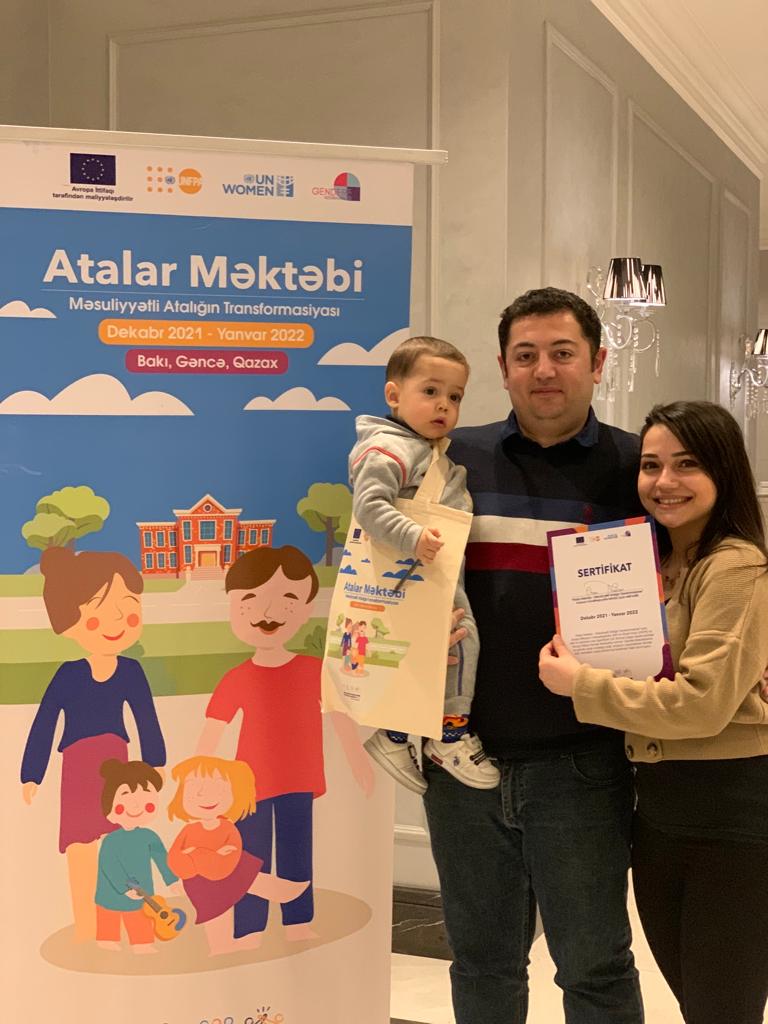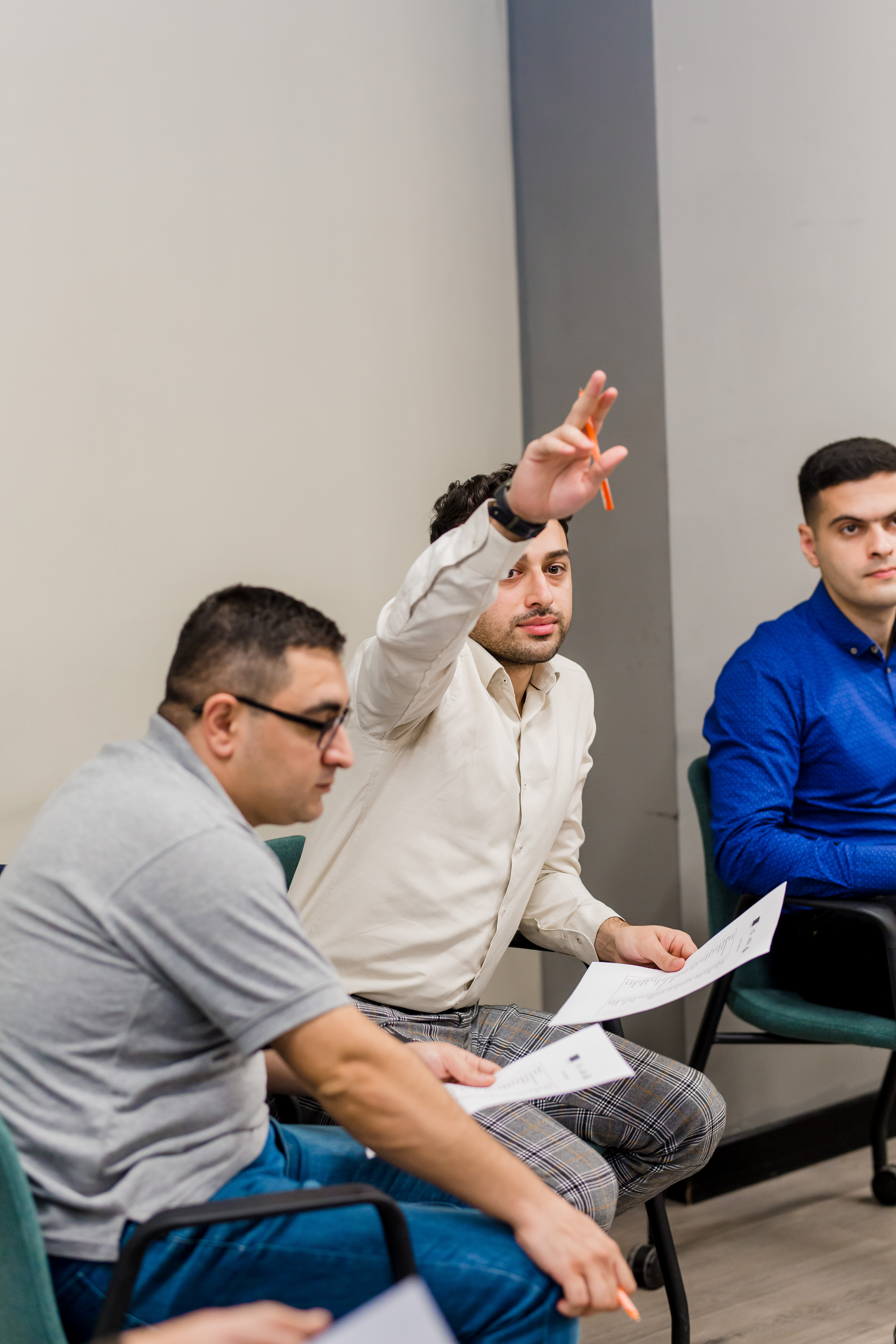BAKU, Azerbaijan. Creating a safe space for fathers to jointly reflect on and question the factors that frame gender inequalities affecting power dynamics within Azerbaijani families was the most important achievement of the Papa Schools project implemented in Azerbaijan. “At first, I believed I would be the only father to join, and was apprehensive that the project would simply fail”, says Orkhan Nadirov from Baku, a father of a 2 year-old boy, “as the topic is not a popular one among men in Azerbaijan, given predominant traditional notions of masculinity in our society”.
Orkhan and his wife were looking forward to the arrival of their first child. However, the end of the first trimester of pregnancy was marked with devastating news that a child was having an inherited blood disorder - thalassemia and the family was recommended to terminate pregnancy. “It was a major dilemma for us; however, me and my wife decided together that we would choose a different path”. Needless to note that Orkhan and his wife were very well aware of the implications of this decision for them. “We started exploring academic literature and searching for resources that could provide any guidance for maintaining effective relationships in families that have kids with similar disorders. All of a sudden, my wife came across information on Papa Schools, and I made up my mind to join. Though my expectations were not as high since I was skeptical that other fathers would interrupt the learning process, I decided to give it a try and see if this could have given me more leverage to explore the concept of a responsible fatherhood”.
Following several months of engagement with a Papa School, Orkhan believes that he managed to gain more than he had previously expected: “What’s unique about this methodology is that despite the focus on father engagement, the information shared was actually concerning both parents, and I was sharing the summary of each session with my wife back home. And so I had a chance to further explore many of these topics through insights provided by my wife and through our shared reflections on many of those topics.”

Orkhan is not the only beneficiary of the project. Papa Schools brought together fathers in three different regions of Azerbaijan - Baku, Ganja and Gazakh in the framework of the “EU 4 Gender Equality“ programme jointly implemented by UNFPA and UN Women with financial support of the European Union. A total of 126 men with almost equal shares of both fathers and fathers-to-be joined and actively participated at the sessions.
One of the important aspects of the Papa School project Orkhan liked the most is the opportunity for the like-minded fathers to remain actively engaged in promoting the concept of responsible fatherhood beyond the project lifetime. Sahil Aliyev, a 28 year-old father-to-be is one of those men Orkhan met at the Papa School. Sahil joined the course with deeply entrenched stereotypes about gender equality in mind, but managed to explore different concepts of what gender equitable relations were about.
Sahil believes that everyone in a society with prevailing patriarchal norms is born into a culture that shapes people’s behaviors and attitudes by forcing them to pick up dominant discriminatory social norms: “At family, at school, at work, we are being taught that men should be masculine. I remember my mother saying that men should have the final word on everything in the family, even if he is not right”.
During the eight-week Papa School courses, the trained experts and facilitators delivered a range of sessions on gender-based discrimination and violence related issues in Azerbaijan. Alongside this, the participants were also given a chance to explore the concepts of family planning and reproductive health, intimate partnerships, abortions, femicides, lack of women’s participation and benefits of women’s empowerment. Sahil was one of those men who were actively participating at every session, and he believes that he gained more insights into the topic he had never discussed before.

“I found myself talking about gender, sex and family relationships - topics that I have never openly discussed with strangers. To be honest, now I admit that I was violent towards my ex-girlfriend by limiting her access to some possible opportunities or imposing restrictions on the way she was dressing-up. But I really wasn’t cognizant about this until participating in the Papa School sessions on gender-based violence. I cannot say that I have managed to get rid of all these stereotypes over the course of these past eight weeks, but I can state confidently that I feel sorry for the way I behaved before. And what I'm sure of now is that having been able to reflect on many of these issues, I’ll do my best to treat my current partner with empathy and full respect.”
It is worth mentioning that another distinctive attribute of the project is its focus on the diversity of experiences and expertise of those involved to lead the effort. "I liked the multidimensional approach of the project. In the course of these past eight weeks, we had a chance to closely interact with not only gender experts, but also doctors, pediatricians and psychologists who were sharing their perspectives with us", says Fuad Valiyev from Ganja, the 32-year-old father of two, who was symbolically granted the “Father of the Year” award at the project’s closing ceremony. Fuad believes in the value of shared workload within the household for promoting gender equality in the family. He says, "I think what makes me a responsible father and a supportive husband is that I try to equally share household and childcare responsibilities with my wife."
Papa Schools have been launched only recently in the three regions of Azerbaijan and it will definitely take time to see the immediate effects of this intervention. However, this model has really managed to showcase a forward looking strategy of how men like Orkhan, Sahil and others in traditional patriarchal societies could join as allies in the efforts to transform unequal social norms by promoting gender equitable behaviors and attitudes and ensuring inclusive and healthy family relationships through men’s active and responsible engagement.
-------------------------------
This story was produced in the framework of the “EU 4 Gender Equality: Together against gender stereotypes and gender-based violence" programme, funded by the European Union, implemented jointly by UN Women and UNFPA.
The story was produced with the financial support of the European Union. Its contents are the sole responsibility of UN Women and UNFPA and do not necessarily reflect the views of the European Union.


